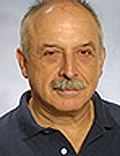February 16, 2012 — Psychostimulant drugs are effective for the treatment of attention-deficit hyperactivity disorder (ADHD) because when they activate the dopamine D4 receptors in the basal ganglia and thalamus, they depress, rather than enhance, motor activity, new research shows.
The finding, from research done in rats, is published in the February 2012 issue of Neuropharmacology and solves the decades-long mystery of how psychostimulant drugs calm, rather than exacerbate, hyperactivity, say the researchers, led by David Erlij, MD, PhD, from the SUNY Downstate Medical Center in Brooklyn, New York.

Dr. David Erlij
"For more than 70 years, ever since they first gave stimulant medication to kids with behavioral problems, we did not understand how the medication worked to control hyperactivity. When you give psychostimulants to the right patients, they are very effective. That was the mystery. How come a psychostimulant diminishes activity?" Dr. Erlij told Medscape Medical News.
When Dr. Erlij and his team injected methylphenidate and methamphetamine into the dopamine D4 receptors in the reticular nucleus of the thalamus (RNT) and the substantia nigra reticulata of male Wistar rats, they found that motor activity was decreased in those areas.
"We studied the RNT because the role of dopamine in this structure had been largely neglected," Dr. Erlij said.
Another interesting fact that is associated with this finding is that patients with ADHD have a defect in the gene that controls the dopamine D4 receptor, although the connection between the gene and the phenotype has not been established, Dr. Erlij said.
"So we know that they have the gene, but you cannot take brain tissue out of a person with ADHD to see whether the receptor is defective or not," he said.
"Now that we know with some precision where calming of hyperactivity is likely taking place in the brain, it may be possible to develop new and better treatment modalities," he added.
"I think it’s great that this has been discovered," R. Scott Benson, MD, who is in private practice in Pensacola, Florida, told Medscape Medical News.
"I am always very interested in discovering the science and mechanisms of action behind the drugs we use to treat disorders such as ADHD. Now we know the reason for this paradox," he said.
Dr. Erlij and Dr. Benson have disclosed no relevant financial relationships.
Neuropharmacology. 2012;62:1111-1118. Abstract
Medscape Medical News © 2012 WebMD, LLC
Send comments and news tips to news@medscape.net.
Cite this: Mystery of Psychostimulant Paradox Solved - Medscape - Feb 16, 2012.








Comments